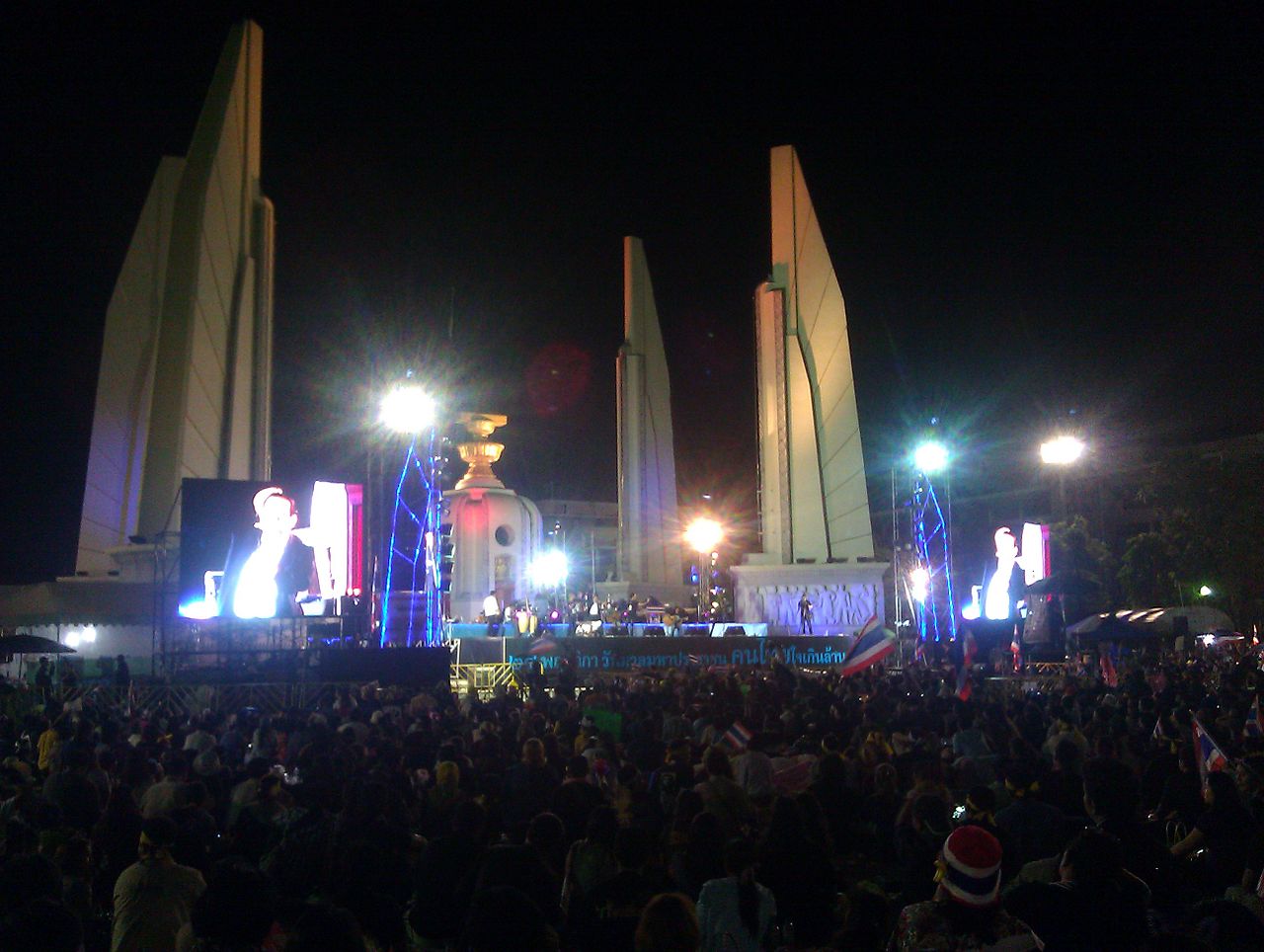IDEスクエア
世界を見る眼
(2019年タイ総選挙)3月24日選挙の重要性――The Significance of March 24 Election in Thailand
PDF版ダウンロードページ:http://hdl.handle.net/2344/00050713
トンチャイ・ウィニッチャクン
2019年2月
(3,968字)
はじめに
2019年3月24日、タイでは選挙が行われようとしている。
今回の選挙もまた、クーデタ、軍政、新憲法制定から新たな選挙へ、そして民主主義の失敗から次のクーデタへと繰り返してきた歴史の一部なのだろうか。タイでは、選挙はしょせん茶番なのか。
現象だけをみると、タイ政治の歴史は同じことの繰り返しのように見える。しかし実際には、これまであった幾多の選挙、民主政治、そしてクーデタや軍政、憲法の数々も、タイの民主化の歴史のそれぞれの局面にあって、独自の意味を持っていた。きたる今回の選挙は、タイ政治史のなかでどのような意義を持つのだろうか。この問いに答えるには、2014年のクーデタと現在起きている政治危機と軍事体制を理解することから始めなければならない。その作業を経てはじめて、今回の選挙が過去20年間のタイ政治史の中でもつ意義を理解できるだろう。

不安定な政治と2006年から続く危機
歴史の観点から見ると、タイの民主化プロセスとは、政治アクター間の権力闘争だったといえよう。すなわち、軍、王党派(monarchists)と一般の人々の三者の闘争である(Thongchai 2008)。1932年に絶対王政が幕を閉じた後も王党派が権力奪回を試みたために、新体制は15年あまりにわたり安定しなかった。1940年代の半ばからは国軍が有力な政治勢力として台頭し、1973年に反軍政の人民蜂起に直面するまで、その地位にとどまった。73年の人民蜂起は、その後一般の人々による大衆民主主義(popular democracy)の隆盛をもたらす契機であったと同時に、王党派が復権を果たした歴史的なターニングポイントでもあった。他方で、国軍の政治力は1973年を契機に衰えた。1980年代に選挙とクーデタが何度か続いたのち、1992年に新たな反軍政運動が起き、国軍はついに「兵舎に戻った」のだった。
1992年から登場したのが、「王党派民主主義」(royal democracy)である。それは一見、議会制民主主義の体裁をとるが、実際には選挙によって選ばれた権力が王党派の政治的な影響と積極的な介入の下に置かれていた(McCargo 2005, Thongchai 2019)。この王党派民主主義による勢力均衡を脅かしたのが、空前の支持を誇り、2001年と2004年の選挙で地滑り的勝利を収めたタクシン・チンナワットだった。2006年のクーデタは、王党派が大衆民主主義を抑制して自らの政治的優位を守るために起こしたものだった。彼らは、国軍を再び政治の場に引き戻すことで目的を達成した。
しかしながら、2006年クーデタ後の軍事政権は短く、王党派の優位を安定させることができなかった。王党派への不満と大衆民主主義への要求は依然として強固だった。その一方で、国軍の政治権力は拡大し、タイの政治危機は長引いた。王室は危機の間も至高の存在であり続けたが、その政治的影響力は、徐々にプーミポン国王にのみ従う国軍への依存を強めていったのである。他方、社会の様々なグループが声をあげ、政府内に影響力を持つことを求めるようになったなかで、大衆民主主義を否定することは不可能であった。グローバルコミュニティのなかで、とりわけ経済関係においてタイが認められるためにも、大衆民主主義が必要なのは明らかだった。
王党派民主主義の危機の鍵は、2000年代半ばから続いたプーミポン国王の健康問題にあった。その比類なき威徳によって、プーミポン国王は王党派民主主義の要でありつづけた。王位継承は、通常の立憲君主制のもとでは非政治的な出来事であろう。しかし王党派民主主義にとっては、重大な政治的影響をもたらす問題となった。2014年のクーデタは、プーミポン国王の晩年における新たな王党派デモクラシー擁護の試みだったと言えよう。そしてそれは成功したのである。
2014年以降の軍事政権
2014年に成立した軍事政権は、タイの歴史上最も苛烈で強力な体制のひとつである。その抑圧の手法は迅速で、効果的で、強硬で、時に荒々しくさえある。軍事政権は徹底的に政治活動を廃絶し、表現の自由、とりわけ王室に関する表現を厳しく制限した。国際社会からのあらゆる反対運動や非難、制裁にもかかわらず、軍政は王党派と国軍エリートの安定を脅かす大衆民主主義を根絶やしにした。2016年10月、プーミポン国王が逝去し王位継承がつつがなく執り行われ、移行期の安定を維持するという任務は達成された。
それにもかかわらず、2014年以降プラユット・チャンオーチャー陸軍大将率いる軍事政権は、王党派の支配を安定させるだけにとどまらなかった。ウィーラユット・カンチューチャットとプライジャック・コンキラットは、現在の軍事政権の課題を「埋め込まれた国軍と階層的資本主義」という表現で描写する。彼らは、政権がしたことを以下のように簡潔にまとめている。
政治に関して、軍事政権が過去とは違う方法でその権力を埋め込んだ様子を示そう。彼らはパワーシェアリングによる統治を追求したのではない……内閣を、議会を、そして国有企業すらも国軍化したのだ。新憲法は、民選勢力に対抗する国軍と伝統的エリートの力を制度化するように設計されたのである。
また経済面では、プラユット政権は中華系タイ人による大企業グループとパートナーシップを組み、大企業が中小企業に対する「兄貴分」として振る舞うことができるプラットフォームを築いた。そこには地場企業の成長を支えるのではなく、競争的な市場を固定的なヒエラルキーに変えようという、大企業の集団的な試みが反映されている(Veerayooth and Prajak 2018, 279)。
軍事政権は、民政復帰後も国軍の影響を保障するため、新憲法や幾多の法律を施行した。例えば、上院は国軍のコントロール下に置かれるため、民選政府は国軍の指令に従わざるを得ない。軍事政権が成したことは、単に王党派のためだけでなく、長期にわたり国軍が隠然と支配を続けるためのものといえよう。王党派と大衆民主主義は、互いに争ったあげく、結果的に衛兵主義(武力を背景とした国軍の政治力行使:訳者注)を甘受せざるを得なくなるのだろうか。
3月24日選挙の意義
今回2019年3月24日に実施される選挙は、以下のような政治的状況のもとで行われようとしている。すなわち、①プーミポン国王のように人気があるわけでも、尊敬を集めるわけでもない新しい君主、②密かに進む一般の人々の間の対立、③ふたたび支配の座に就くことを熱望する国軍、の三つである。
王党派は、国軍への過度の依存はできないことを知っている。彼らは国軍と取引するために「人々」、あるいは大衆支持が必要なのだ。その一方で、大衆民主主義は王制による支配にとっていまひとつの脅威となっている。プーミポンがいなければ王室の威徳は不安定なものであり、それゆえに王党派優位の現状はこれ以上持ちこたえられないかもしれない。
プーミポン国王の時代、国軍は常に彼らが「王の兵士」であることを主張してきた。はたして、彼らは国王らしからぬ振る舞いで知られる現在の国王に対しても同様に忠誠を誓うのだろうか。国軍の急速な台頭、とりわけ国家と社会へ浸透した経緯は、彼らが最高の権力を視野に入れつつあることをうかがわせる。彼らは、長期にわたって居座るためにここまでやってきたのであって、単に王党派民主主義の番人に留まるか、ましてや選挙後に「兵舎に戻る」ためではない。
当初、人々は社会の安定や秩序の回復をもたらしたクーデタを支持した。しかし、ここ数年経済が減速し、軍事政権は恥知らずにも多くの点で見当外れだという状態になるにつれ、人々と軍事権威主義との軋轢は増していった。一般の人々の代表者は政党や政治家の他にいないが、彼らの意見や利益が必ずしも代弁されるわけではない。
プーミポン国王の時代は、王党派の優位の下で三つの政治勢力の力関係が安定するのが政治の定常状態であった。マクロの視点から見れば、来る選挙は王党派という要が不在となり、国軍が1992年以降最も力を蓄えた状況下で行われる、最初の重要な政治行動である。それは、三つの政治勢力の間の新たな勢力関係ないし新たな定常状態を構築する初めての大きな試みとなるだろう。今回の選挙は、唯一でも決定的なものでもないが、我々に権力関係の変化を示し、将来起こりうるシナリオを示唆するものとなろう。
今回の選挙とそれに関係するすべてのこと、すなわち法律、選挙行動とその結果は、こうした歴史の文脈の中で観察することではじめて理解できるだろう。
(翻訳:青木まき)
著者プロフィール
トンチャイ・ウィニッチャクン(Thongchai Winichakul) 。アジア経済研究所新領域研究センター上席研究員。ウィスコンシン大学名誉教授。主な著作にSiam Mapped: A History of the Geo-Body of a Nation, Honolulu: University of Hawaii Press, 1994(石井米雄訳『地図が作ったタイ――国民国家誕生の歴史』明石書店、2003年)。
参考文献
- 英語版の末尾に記載した。
写真の出典
- 2013年11月30日に民主記念塔に集まった反インラック政権のデモ隊:ilf_ [CC BY-SA 2.0 (https://creativecommons.org/licenses/by-sa/2.0)], via Wikimedia Commons.
Thongchai Winichakul
February 2019
Introduction
Thailand will go to election on Mar 24, 2019. Is this another election in the repeated history of coups, military rule, new constitution and another election that ends with another failure of democracy, hence another coup? Is an election in Thailand a farce? The seemingly a repeated cycle of political history is a superficial observation of the apparent phenomena. In fact, many elections, democracies, even coups, military rules and constitutions in the past were meaningful in various ways in the particular moments of history of democratization in Thailand.
What is the unique significance of the upcoming election Thai politics and history?
To answer this question, we need to step back to understand the current military regime, the 2014 coup and Thailand's on-going political crisis, then we will understand this election in the context of political history of the past two decades.
THAILAND'S UNSTABLE POLITICS AND THE CRISIS SINCE 2006
Looking from a broad historical perspective, we can say that the democratization process in Thailand has been the contests of power among three main political forces, namely the military, the monarchists, and ordinary people (Thongchai 2008). After the end of the absolute monarchy in 1932, the new regime was unstable for about 15 year, as the monarchists tried to resume to power. From the mid-1940s, the military rose to become the dominant political force until the popular uprising in 1973, the historic turning point that followed by the surge of popular democracy of ordinary people and, at the same time, the revived political power of the monarchists. The military's political power, however, began to decline since then. After a few more elections and coups in the 1980s, and another popular uprising in 1992, the military retreated from politics "back to the barrack".
From 1992, "royal democracy" has been in place. Ostensibly, it is a parliamentary democracy, but the elected authority was in fact under the influence and active supervision by the monarchists (McCargo 2005, Thongchai 2019). The unprecedented popularity of Thaksin Shinawatra, who won landslide elections twice in 2001 and 2004, however, made the elected authority a threat to the status quo, i.e. the royalist democracy. The coup in 2006 was an attempt to secure the royalist political dominance by curbing the growing popular democracy. The monarchists did so by bringing the military back into politics.
The brief military rule after the 2006 coup, however, failed to stabilize the royalist dominance. The discontent with the monarchists and the demand for popular democracy remained strong. Meanwhile, the military's political power also expanded. Thailand's political crisis has protracted. Although the monarchy remains supreme throughout the crisis, its political power relies increasingly on the military, which was subservient only to King Bhumibol. Popular democracy, on the other hand, cannot be denied as every sector of population and society wanted to have their voices and some power in the government. It is also undeniable if Thailand needs recognition with the global community especially in terms of economic relations.
A key factor to the crisis of royal democracy was the deteriorating health of King Bhumibol since the mid-2000s. Given his unparalleled moral authority, he had been the lynchpin of royal democracy. The royal succession — a supposedly non-political matter in a normal constitution monarchy — became a matter of huge political consequences for royal democracy. The coup in 2014 was another attempt to secure royal democracy in the final years of King Bhumibol. It was successful this time.
THE JUNTA REGIME SINCE 2014
The junta regime after the coup in 2014 is one of the fiercest and most powerful military rules in Thai history. Its repressive measures were swift, effective, uncompromising, and even brutal at times. The junta decisively eliminate all political activities and severely limited freedom of expressions especially about the monarchy. Despite the protests, condemnations and sanctions of various degrees from the international community, the junta has been able to secure the dominant power of the monarchists in alliance with the military elites. As King Bhumibol passed away in October 2016 and the succession was without a glitch, the task of securing the transition period was accomplished.
Nevertheless, the junta regime under General Prayuth Chan-ocha since 2014 has done much more than securing the royalist dominance. Veerayooth Kanchoochat and Prajak Kongkirati characterize the agenda of the current junta regime as the "embedded military and hierarchical capitalism". They summarize what the regime has done succinctly as follow.
Politically, we indicate how the junta has embedded its power in ways different from the past. It does not pursue a power-sharing governance ... but tries to militarize the cabinet, parliament, and even state-owned enterprises. The new constitution is designed to institutionalize the power of the military and the traditional elite vis-à-vis the electoral forces. ... Economically, the Prayuth regime forms a partnership with a group of Sino-Thai conglomerates to establish the [scheme that] ... has become a platform through which the giant firms perform the leading role of 'Big Brother' in supervising small businesses in their sectors, [reflecting] the collective endeavors of the conglomerates to replace competitive markets with hierarchy, rather than encouraging local firms to catch-up with them (Veerayooth and Prajak 2018, 279).
The junta also enacted a new constitution and many laws to secure its power even after the return to democracy. The military would, for instance, control the upper house and the elected government must obey the directives of the military. The accomplishments of the junta seem not only for the monarchists but also for the non-explicit military rule in Thailand in the long-term. Is "praetorianism" the new status quo that the monarchists and popular democracy — the other two contending political forces — would be contented with?
THE SIGNIFICANCE OF THE 24th MARCH ELECTION
The upcoming election on March 24, 2019 will take place in such a political scenario as described, namely, 1) the new monarch who is not as popular or revered as Bhumibol; 2) the undercurrent dissention among ordinary people; and 3) the military that aspires for political dominance again.
The monarchists knew that they should not dependent too heavily on the military. They need "people" or popular support to bargain with the military. Despite that, popular democracy is also a threat to the monarchical dominance. Without Bhumibol, moreover, the moral authority of the monarchy is in doubt, thus the status quo of royal dominance may not be tenable much longer.
In the reign of King Bhumibol, the military always proclaims that they are "soldiers of the king". Would they vow the same under the current monarch who has been notorious for the not-so-kingly personal character? The rapid ascendency of their power, especially their embeddedness in the state and society, suggests that the military have a vision for their eventual supremacy. They are here to stay for a long term, not merely a caretaker for royal democracy and definitely not to return to barrack after the election.
Despite the initial popular support to the coup for the sake of peaceful and orderly society, people's dissention to the military authoritarianism is growing, especially in the past year as the economy has been sluggish and the ruling junta became shamelessly out of touch in many respects. Ordinary people, however, have no agency in the present time other than those political parties and politicians who do not always represent their voices and interests.
The political status quo under King Bhumibol meant the settlement of power relations among the three main political force with the dominance of the monarchists. In this macro-political perspective, the upcoming election will be the first important political action in the absence of the lynchpin of the monarchist dominance but with the most powerful military since 1992. It will be the first major attempt to construct the new power relations, or the new status quo, among the three forces. Although it will not be the only or the decisive one once and for all, the election may tell us the shifting balance of power and may foretell us the possible scenarios to come.
This election and all matters about it — laws, electoral behaviors, actions, and the outcomes — should be observed and understood in this historic context.
About the Author
Thongchai Winichakul. Chief Senior Researcher in IDE Inter-disciplinary Studies Center, Emeritus Professor, University of Wisconsin-Madison (2016–). The author of Siam Mapped: A History of the Geo-Body of a Nation, Honolulu: University of Hawaii Press. He is doing research on the intellectual transition to modernity in Siam in the mid-19th to early 20th century, currently focusing on the transformation of the rule of law. His forthcoming book will be about the October 6, 1976, massacre in Bangkok.
Reference
- McCargo, Duncan. 2005. "Network Monarchy and Legitimacy Crises in Thailand", Pacific Review, 18, 4, pp. 499-519.
- Thongchai Winichakul 2008. "Toppling Democracy", Journal of Contemporary Asia, 38, 1, pp. 11-37.
- Thongchai Winichakul 2019. "Thailand's Royal Democracy in Crisis" in After the Coup: The National Council for Peace and Order Era and the Future of Thailand, ed. Michael J. Montesano, Terence Chong and Mark Heng, Singapore: ISEAS Yusof Ishak Institute, pp. 282-307.
- Veerayooth Kanchoochat and Prajak Kongkirati 2018. "The Prayuth Regime: Embedded Military and Hierarchical Capitalism in Thailand", TRaNS: Trans-Regional and -National Studies of Southeast Asia, Volume 6, Issue 2, July 2018, pp. 279-305.


